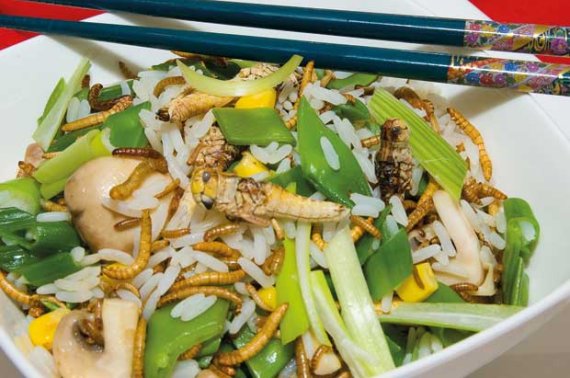New sources of protein are needed in order to feed the world, which is why we are seeing insects, algae and seaweed on the menu with increasing regularity. But how safe are these novel foods really? We don’t know yet, research by Rikilt suggests.
Eating insects is hip, partly thanks to the research, the books and the snacks produced by Wageningen entomologists. They contain highly nutritious proteins, but we do not know yet how safe all these grasshoppers and mealworms are, says Marjolein van der Spiegel of Rikilt. She did a literature study on the food safety of insects and other novel foods.
‘If you take insects from a rice field, for instance, there can be pesticides on them,’ says Van der Spiegel. ‘Insects can also contain heavy metals and harmful bacteria, and the protein in them can be allergenic. It depends on the type of insect and on the environment they live in. You need to look into that specifically before you accept them in Europe.’ Other new sources of protein such as algae, seaweed and rapeseed can be a danger to public health too. It is known that algae and seaweed easily absorb heavy metals. They are used in the purification of waste water for precisely that reason. But you don’t want those heavy metals in food or livestock feeds. Van der Spiegel also thinks there is a good chance that rapeseed contains allergenic proteins, since it is a relative of the allergenic mustard seed. All this needs to be studied and regulated. Until that has been done these novel foods are not permitted in the European Union.
The admission procedure for these new food products can take up to three to five years. The admission procedure for using insects and algae in livestock feed is a little simpler and faster, but it is still difficult. The EU is now looking into the question, for example, of whether we should see insects as animals. If the answer is yes, we are not allowed to process insects into livestock feed because of the European legislation on BSE. To make that possible, the EU legislation would first have to be changed. The EU should change and clarify the legislation to stimulate the development of these novel foods, says Van der Spiegel this month in the journal Comprehensive Reviews in Food Science and food Safety.
But there is a role for the industry too, including Dutch insect breeders: producers will have to submit dossiers on their products for admission to the Dutch food market. Because although various species of algae have already been approved in the EU as novel foods, no insects have that status to date

